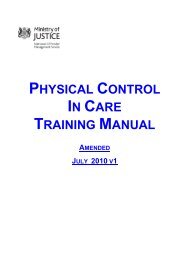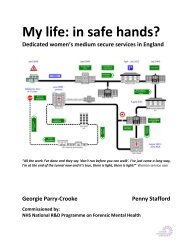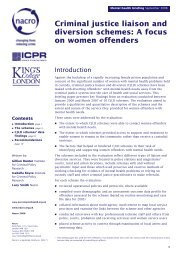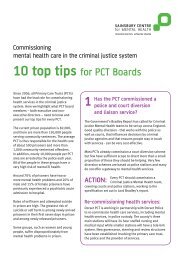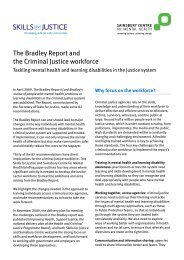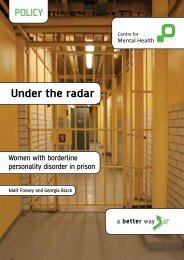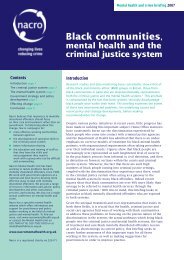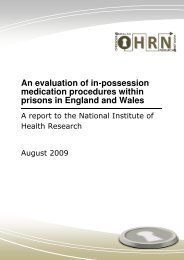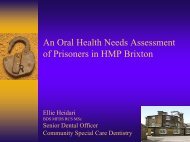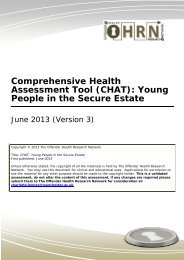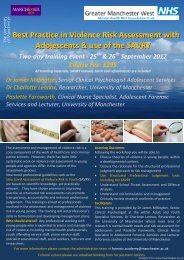Engendering Justice - from Policy to Practice - The Fawcett Society
Engendering Justice - from Policy to Practice - The Fawcett Society
Engendering Justice - from Policy to Practice - The Fawcett Society
- No tags were found...
You also want an ePaper? Increase the reach of your titles
YUMPU automatically turns print PDFs into web optimized ePapers that Google loves.
<strong>The</strong> Commission recommends that if prison staff becomeaware, or have a suspicion, that a woman has been a victimof trafficking that she is referred immediately <strong>to</strong> supportservices such as the Poppy Project. In cases where anappeal against a cus<strong>to</strong>dial sentence on the grounds thatan individual has been trafficked is underway, and theindividual’s sentence expires, the woman should not beau<strong>to</strong>matically sent <strong>to</strong> a detention centre but should bereleased in<strong>to</strong> the care of an appropriate support service,pending the outcome of the appeal.Women with his<strong>to</strong>ries of violence and abuseOne in three women in prison report having experiencedsexual abuse and over half have suffered domestic abuse. 81<strong>The</strong> Bradford Rape Crisis & Sexual Abuse Survivors Servicein their annual report (2007-08) noted that 81.7 percent ofwomen they have seen at HMP & YOI New Hall during theyear in the provision of their women’s counselling servicehave suffered domestic violence or sexual abuse. 82 <strong>The</strong>relationship between female offending and his<strong>to</strong>ries ofviolence and abuse has received increased attention overthe past few years. Research has noted the significanceof the criminal justice system as a major source ofintervention in women offenders’ lives and the opportunityfor the probation and prison service <strong>to</strong> take a lead role inco-ordinating the contributions of specialist and voluntarysec<strong>to</strong>r agencies in order <strong>to</strong> help women deal with pastviolence and abuse. 83Counselling services such as that provided by BradfordRape Crisis and Sexual Abuse Survivors Service (see box)are therefore crucial. However, the funding and provisionof services <strong>to</strong> help female offenders deal with past abuseis limited. Rape Crisis <strong>to</strong>ld the Commission that the needfor work within prisons with survivors of sexual abuse isurgent but it cannot be undertaken without a Governmentcommitment <strong>to</strong> fund these programmes. 84Good <strong>Practice</strong> Example: CounsellingService in HMP New Hall<strong>The</strong> Bradford Rape Crisis and Sexual Abuse SurvivorsService delivers a full time counselling service at HMPNew Hall. <strong>The</strong>y work with women who have been raped,sexually abused, physically, mentally or emotionally hurtas children, or have suffered <strong>from</strong> any form of violenceas adults. This service is highly valued by those whouse it and has a demonstrated positive impact. <strong>The</strong>short and long term counselling has helped women dealwith their past and plan for their future, build safe andconfident relationships, provided women with skills <strong>to</strong>deal constructively with problems and increased theirself worth. In the year <strong>from</strong> April 2007 <strong>to</strong> March 2008,929 appointments were provided by the service and 344referrals were made <strong>to</strong> them.Email address info@brcg.org.uk Tel: 01274 723896Staff who work in women’s prisons and probation servicesshould be trained <strong>to</strong> address the needs of female victimsof violence, including screening, risk assessment, safetyplanning and referral <strong>to</strong> specialist services.Resettlement NeedsFamily break up is more severe and final for femaleoffenders and it is more difficult <strong>to</strong> repair relationsespecially if children have spent time in care. Men tend <strong>to</strong>leave prison and be met by their families. Women moreoften leave alone. 85Women in Prison <strong>to</strong>ld the Commission they are particularlyconcerned that the two new pathways for womenoffenders are not translating in<strong>to</strong> changes in the approach<strong>to</strong>wards, and provision for, resettlement. 86 Further, thereare particular problems for female prisoners in relation <strong>to</strong>accommodation, accessing benefits and services andregaining cus<strong>to</strong>dy of their children.Women often face different and more complex housingissues than male prisoners upon release, with one third ofwomen losing their homes while in prison. For example,as St Giles Trust <strong>to</strong>ld the Commission, big hostels for thehomeless are often not a safe place <strong>to</strong> house vulnerablewomen but in cities (and particularly London) there maybe no other option. Women’s role as primary carers alsoPage 39



